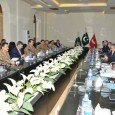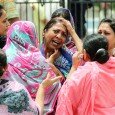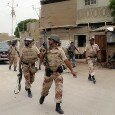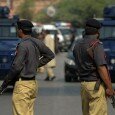By Syed Irfan Ashraf –
Reporting conflict areas
Apologetic media professionals have become a regular feature of every seminar and workshop in Pakistan. They always paint a gloomy picture of journalism in the country. Official discouragement and insecure working environment are the two vital factors, which they hold responsible for discouraging the morale of journalists. In reality, however, cynical disillusionment among the professional journalists creates a framework for internal weakness that translates itself to apologetic journalism.
By and large, it is impossible to curtail channels of expression in the information age of today. The magic of the new media has provided public with more feasible alternatives to freely upload or download almost anything. It only needs computer literacy and the expertise to strategically package a message to turn an issue into a solid online campaign. Globally, the outcome of this strategic thinking has carried amazing impact on journalism and beyond. More so, it has empowered media professionals to enlarge the scope of reporting. Even amateur users have brought a revolution in the closed societies of the Arab world.
In an era when common people throughout the world are getting back their lost voices, journalists in Pakistan are still crying foul. Instead of tactfully exploiting the available alternatives, most of them oscillate between two extremes. Some can be seen willfully compromising the truth, while others divulge it a tad too rashly. If any journalist provokes a backlash, the rest offer it as an excuse to compromise truth. This is the way professional journalists are working in Pakistan: a few are threatened and the rest automatically become tame.
Sometimes back a discussion was held in Islamabad about the role of media in conflict situation. Some journalists complained that they find it hard to report on encroachment set up by an Intelligence Agency right in the heart of Islamabad city. “Whenever we want to report closure of public roads by the Inter-services Intelligence Agency (ISI), our editor stops us short of taking any step,” said one reporter in a workshop held in Islamabad. He, however, could not respond satisfactorily when asked if he had looked for alternatives to address the issue properly and safely.
Similarly, scores of print media journalists, who work in the conflict zone of the Khyber Pakhtunkhwa province and Tribal belt of Pakistan, report from the safety of their houses. They avoid moving into the field for fear of being killed in the line of duty. In conflict sensitive journalism it is not wrong to stay safe by reporting from a secure station or position. After all journalists are hired to offer their skills and services, and not their lives. Therefore, primary responsibility of a conflict sensitive area reporter is to stay safe, and then to do anything else. However, the problem emerges when a one-time or some-time compromise turns into a perennial malaise and journalists start justifying their docile approach in the larger interests of their profession. This is happening nowadays, where a journalism of compromises has overshadowed quality of work in the profession.
Every day, stories of high public value are being killed in the hard terrains of a conflict zone or thrown into dustbin in the comfort zone of a newsroom. Mainly because such stories usually involve someone more powerful. In other words news is usually not considered a news if it hurts interest of a powerful party in the conflict. As said, journalists in Pakistan are not only paid for what to publish. They are also paid for what not to publish.
Nevertheless, there are shining examples to quote here, which show that everything is not all need not be in gray. Sometimes journalists do more than what they can be expected to do. Such trend-setting jobs usually involve trend-setting minds. In 2009 a horrible phase of custodial killing ensued from the defeat of militants in Swat valley of Khyber Pakhtunkhwa. In some places dead bodies were fixed atop roadside poles to deter common people. On one hand the situation was disturbing for the insecure local population of Malakand Agency, while on the other it was an international human rights issue bringing bad name to the country. Gravity of the situation and sensitivity of the issue compelled journalists in Peshawar to avoid being judgmental on the basis of eyewitness accounts. But no politician or social figure was ready to raise objection to the criminal act on the part of the state institutions.
Few local journalists in the provincial capital Peshawar took the lead to draw their countrymen’s attention towards the sorry state of affairs. They visited the Human Rights Commission office in Peshawar to mobilize their resources for taking a lead to fix responsibility for the crime. Subsequently, a meeting was convened in Peshawar in which the local journalists briefed the visiting HRCP official Asma Jehangir about the human rights violations. After reaching Lahore, Asma Jehangir condemned this act of human rights violation in a hurriedly called and heavily attended press conference. She held the security forces responsible for killing people on suspicion of carrying out militancy in Malakand Division. Thus for the next one month custodial killings were screaming headlines in media, which brought respite to this lynching wave in public places in Swat valley.
Under the challenging circumstances, journalism is hardly a profession for the ill prepared lot. It is a purposeful profession only for the ‘thinking’ practitioners. “Effective journalism in Pakistan requires media professionals to develop the capacity to think out of the box,” says Bakht Zaman, journalism teacher in the University of Peshawar. However, despite high hopes and some visible progress on the surface, development in journalism is not keeping pace with requirements of the changing spirit of time. Journalists usually prefer not to offer resistance in case a powerful party is involved in the story. Nor do they use any alternative ways of reporting objectively on issues of high public importance. Why is it so?
Traditionally, journalists in Pakistan write more but read less. Many a time they do not bother even to read their own stories. Such an environment usually gives birth to professionally handicapped practitioners. Independent reporting is difficult for them because they usually find hard to develop clear insight into the situation at hand. This weakness increases their dependency on the source of information and makes them bereft of the capacity to professionally adjust to the demanding situation by being insightful. This discrepancy is visible in some section of the apologetic journalists. When they find themselves incapable to meet their professional obligations, they start looking for excuses to justify their existence in the field.
Further more—good for journalists but not so well for journalism—working pattern has undergone phenomenal change after Pakistan became frontline state in the US war on terror. The rise of militancy in Pakistan coincided with a boom in electronic media. Synthetic affluence hit the local market after huge money was pumped in the nascent service industry. Working journalists jumped from 2500 in 2000 to 17000 in 2011, which led to decrease in their average age from 47 years in 2000 to 24 years in 2011. Despite the influx of youth, there is a dark side to it as well. With the added focus of the foreign NGOs on Pakistan, resourceful journalists in the urban centers of Peshawar, Islamabad, and Lahore are no more dependent on journalism only. In addition to their own newspapers, their affiliation with such organizations has put a question mark on their professionalism. This is the way multitasking has robbed journalist community of quality professionals, who are using the platform as means to an end and not an end in itself.
More serious than all is the growing imbalance between rich and poor journalists. Though educated and urbanized media professionals are earning from more than one source, majority of the rest are not so lucky. They are the victims of their own harsh working conditions. Majority of them are underpaid; some are not paid on time, while the rest are not paid at all. In addition to it, media owners invest almost nothing in the capacity building of their less-privileged workers. This has put journalist community in quandary. Pressures on them are mounting from every direction but they lack the capacity to diffuse them professionally.
Given the deplorable situation, primary responsibility rests with the journalists’ bodies. Instead of ensuring plots in housing societies for their members, such organizations need to focus more on their capacity building. Trainings will help them understanding their role in a conflict, which has caught them unprepared.
After all journalists are neither courtiers nor stenographers. Their primary responsibility revolves around “objective” reporting. In a situation which requires journalists to play aggressive and independent roles for shielding public interests, being apologetic for not ensuring rigourous journalistic standards serves no purpose.






























































































